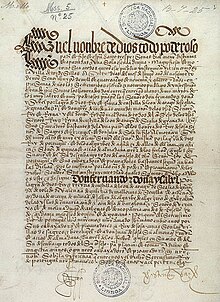Tordesillas Line
| Treaty of Tordesillas | |
|---|---|

Front page of the Portuguese-owned treaty
|
|
| Created | 7 June 1494 in Tordesillas, Spain |
| Ratified | 2 July 1494 in Spain 5 September 1494 in Portugal |
| Location |
Archivo General de Indias (Spain) Arquivo Nacional da Torre do Tombo (Portugal) |
| Author(s) | Pope Alexander VI |
| Signatories |
Ferdinand II of Aragon Isabella I of Castile John, Prince of Asturias John II of Portugal |
| Purpose | To divide trading and colonising rights for all newly discovered lands of the world located between Portugal and Castile (later applied between the Spanish Crown and Portugal) to the exclusion of other European nations. |
The Treaty of Tordesillas (Portuguese: Tratado de Tordesilhas [tɾɐˈtaðu ðɨ tuɾðɨˈziʎɐʃ], Spanish: Tratado de Tordesillas [tɾaˈtaðo ðe toɾðeˈsiʎas]), signed at Tordesillas on June 7, 1494, and authenticated at Setúbal, Portugal, divided the newly discovered lands outside Europe between Portugal and the Crown of Castile, along a meridian 370 leagues west of the Cape Verde islands, off the west coast of Africa. This line of demarcation was about halfway between the Cape Verde islands (already Portuguese) and the islands entered by Christopher Columbus on his first voyage (claimed for Castile and León), named in the treaty as Cipangu and Antilia (Cuba and Hispaniola).
The lands to the east would belong to Portugal and the lands to the west to Castile. The treaty was signed by Spain, 2 July 1494 and by Portugal, 5 September 1494. The other side of the world was divided a few decades later by the Treaty of Zaragoza or Saragossa, signed on 22 April 1529, which specified the antimeridian to the line of demarcation specified in the Treaty of Tordesillas. Originals of both treaties are kept at the Archivo General de Indias in Spain and at the Arquivo Nacional da Torre do Tombo in Portugal.
...
Wikipedia
